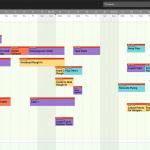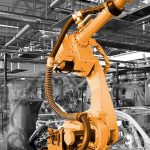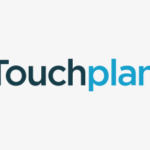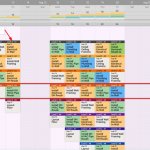Touchplan recently formed a marketing collaboration with Genda, a real-time data gathering platform for the superheroes on construction sites, namely superintendents and project managers. We sat down with CEO Erez Dror to learn more about their technology and why they chose to collaborate with Touchplan.
So to kick it off, we’d love to hear more about Genda and what was your motivation for starting the company?
So allow me to start with a bit of background on myself because, as you will see, it ties directly to Genda. After spending some time in the military like every Israeli, I started working in construction as a construction laborer about 13 years ago. The company that I worked for was building single-family homes, and as I gained more experience, I fell in love with everything related to construction and decided that that’s what I wanted to do with my life. I made two simultaneous paths in construction, a professional one and an academic one. So I became an assistant superintendent working on projects in Tel Aviv for a prominent developer in Israel. I also held positions as a structural engineer, BIM Manager, and eventually a Project Manager. At the same time, I earned a Bachelor’s and Masters in civil engineering. So I got to see the industry from different perspectives. The challenges that I was facing as an assistant super on-site, I discovered the solutions as a researcher as part of my Master’s thesis, and it all clicked. It was at that moment I realized I had something. My first call was to the people that ended up being my co-founders. Eyal Kulik, our COO and a childhood friend was the first to join. As we started working on Genda a few months later, Shai Levy joined the company as our CTO. That was three years ago, and the motivation to start the business was that we had all experienced construction challenges firsthand and knew we could develop technical solutions. We did the initial technical work and field/pilot testing in Israel, but the first commercial project, we deployed in Texas. Today we have been used on quite a few construction sites totaling a few million square feet.
Can you tell me more about what Genda does and its greater value to the construction market?
So when you look at it from the 10,000-foot level, it’s a software solution for general contractors. We are mainly working on commercial construction firms, and Genda provides construction project teams with visibility and clarity on what’s happening on site. We generate data from the construction site, the production floor at the construction phase. So we monitor the site resources, like labor equipment and material, in a way that generates data. We then analyze the data to understand what activities are happening on site. For instance, plumbing is being done in unit 1571, and flooring is being done in level 19, then we analyze those activities to optimize operations and safety. We like to look at it as a sidekick for the superhero (the superintendent & the PMS). So it’s a tool that shows them exactly what’s happening and makes sure they’re not missing anything.
So how’s the reaction been from the market so far?
We see that the fun part about building a solution is that we’re solving a real pain for many stakeholders in the construction industry. The hard part is prioritizing what problems you want to solve. The construction industry is amazing, but many things can be done more efficiently and safely. So with every step we take, we see a value for the developer, the subcontractor, and the worker. We’re choosing the ones that we think can best solve these people’s present challenges. So the reaction has been good. People get what we are trying to accomplish right away. As you know, it’s not always an easy sell in construction because it’s a very traditional industry, and adoption/acceptance can take some time. Still, it got way more manageable as the value is easily seen.
So what’s that value that the field staff gets from it?
Clarity. Genda fosters data-driven decisions on site. It enables field workers to make sure they’re not missing anything. When decisions have to be made, they can be made based on data, which is happening daily. For example, if I want to send a team to work in a specific location, Genda provides the status of that location and makes sure it’s ready for them. We can also look at it from a historical point of view because the data documents everything that happened on site. So we know which trade worked in which location and for how long. It also helps with a lot of aspects related to risk management. If someone gets injured, Genda tells you who was there in case you needed to speak to anyone about the incident.
Tell us about the motivation for partnering with Touchplan?
Let me start with the vision for Genda because that’s one of the steps that we’re taking in that direction. We’re aiming to automate a lot of the superintendent’s activities. We want to help them optimize the way they assign tasks. So to assign an activity, we need to understand there is a plan. The project team created a plan of what they want to do, in what order, and the time it should take. We know in many cases, the plan doesn’t meet the reality, or the reality doesn’t meet the plan because construction can be complex. Genda is making those optimizations for a plan with the software. In following Lean principles, we have to Plan, Do, Check, and Act. We plan, we do, then we need to check and fix the plan. So, to do that, we need a plan. So we knew from day one that we needed to have the plans in Genda. Planning was a world that we did not want to go all in. So we always intended to take partnerships, not only in the scheduling phase but with other software solutions. Touchplan does a fantastic job planning and scheduling. So if we can take the plan part and provide the doing and check part, it’s a win-win situation for both.
You mentioned earlier that Genda is a tool designed for superheroes (Supers & PMs). Are they the only users of it?
That’s a great question, and it relates to what I said before that everybody can get value. When you have data, the possibilities are endless. Our key users are absolutely the field management team. But related to your question, subcontractors also see a lot of value in the tool. So the exciting part is that the subs pay their workers on an hourly basis. However, they can have a lot of constraints that don’t allow them to work as they want. A sub gets paid for the work they’ve done, but they pay their workers according to the time they spend. So subcontractors want to make sure that their workers can work as much as possible. The data that Genda generates shows to the subs if they can do that work, and we’re enabling them to report to the GC, so that’s a value add for them.
So what do five years down the road look like for Genda?
We have a big vision. If we look at the industry at the macro level, the first wave of innovation is digitalization. There has been digitization of plans, schedules, RFIs, etc., so everything is there. But we’re missing the execution part. I believe that in five to ten years, we will see the next phase optimize the execution on-site, which will lead to several data sources and very sophisticated AI. The main challenge for the construction industry is the labor shortage. Not just laborers but the backfill of field managers. Unfortunately, not enough people want to work as field managers. If we look at the trends of how much new construction talent is coming into the pool, we won’t be able to build. We must make our field managers more productive so they can execute the challenging projects they are working on. And while many tasks can only be done by a person, things like daily reports, analysis, and other data gathering can be done by machines and done better because, for a computer, it’s a simple analysis. Our goal is to grow and do very sophisticated stuff for the superhero. So we’re not planning to replace the superhero, but we understand that in five years, there won’t be there won’t be enough superheroes left. So if the project needs five supers, we want to fill the needs of three. And to do that, we need integrations and tech partners. Working with Touchplan is a significant relationship. But 360 Capturing solutions, laser scanning, and other data sources like crane monitoring; are some of the things we hope to develop in-house, and eventually, we want to be the insight machine.
Where can folks find out more about Genda?
The best place to head is our website, https://www.gendatech.com/ to learn more about how we help construction field staff each day on the jobsite. Also, please take a look at our video.










